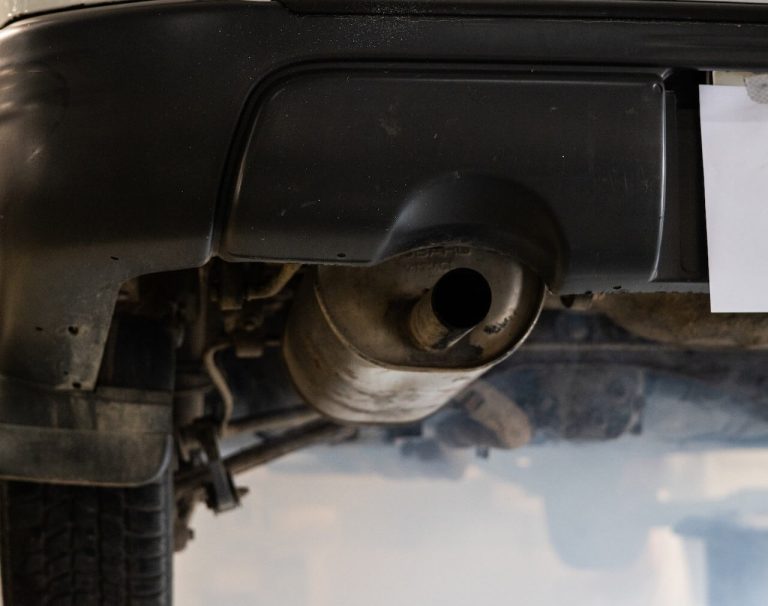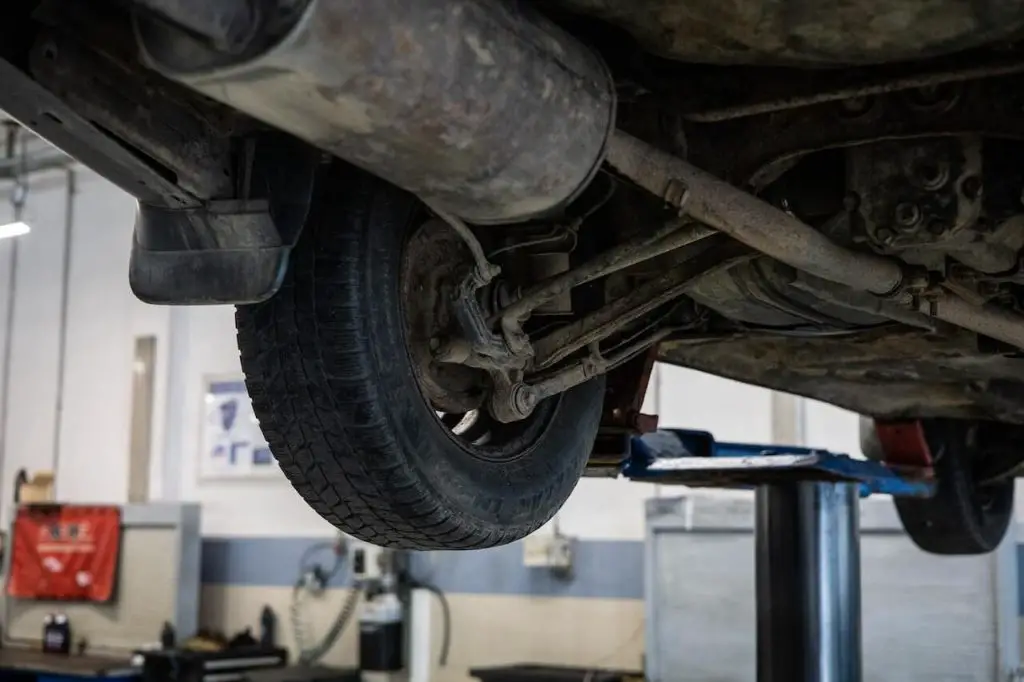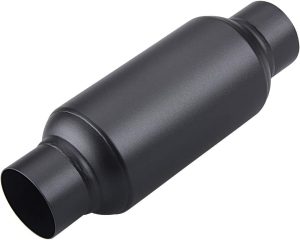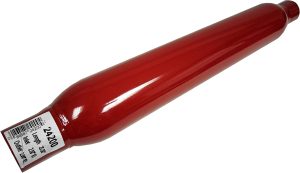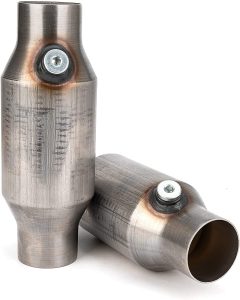Mufflers are an important vehicle component, providing various benefits that ensure the safety and smooth operation of the car. Without a muffler, you can face costly fines or significant damage to your car due to the loud noise it will make. So, how long can you drive without a muffler?
The purpose of writing this comprehensive guide is to explore the outcomes of operating a vehicle without a muffler, factors that influence the duration of time one can drive without a muffler, and the potential legal repercussions. By understanding these points, you can ensure proper maintenance and avoid costly repairs or fines!
The article will discuss why a muffler is important, the risks associated with driving a vehicle without one, the maximum safe duration for driving without it, and the legal repercussions of doing so. Read on to learn more about driving safely with a functional muffler!
Table of Contents
ToggleHow Long Can You Drive Without a Muffler?
Driving without a muffler could be extremely dangerous to your health as well as the environment. Additionally, you could get into legal trouble if you are caught driving without a muffler.
The amount of time you can drive without a muffler will vary based on several factors, such as the type of car you have and the laws in your area. Generally speaking, however, it is not recommended to drive for more than a few minutes without a muffler.
This is because driving without one could result in loud noises that could potentially annoy or disrupt nearby people and be a nuisance. Additionally, the gases emitted by your vehicle can be hazardous for you as well as those around you if driven without a muffler.
How a Muffler Works?
The muffler plays an important role in a car’s exhaust system, serving multiple purposes to ensure a pleasant and secure driving experience. A muffler reduces noise and vibration from your engine by using chambers and tubes filled with packing material or sound-absorbing materials such as fiberglass.
The main purpose of the muffler is to decrease the noise coming from your engine’s exhaust.This is achieved by blocking and reflecting sound waves or creating a “tunnel” effect within the muffler chamber that absorbs some sounds. Additionally, a muffler can help reduce exhaust vibrations, providing a smoother driving experience.
Components of a Muffler
Several components make up a typical muffler:
Inlet pipe: The exhaust gases enter the muffler through the inlet pipe.
Outer shell: The outer shell is the exterior casing of the muffler and is designed to protect the other components from damage.
Baffles: Baffles are thin, perforated metal plates that are designed to reflect and absorb sound waves as they pass through the muffler.
Chambers: Chambers are cylindrical spaces inside the muffler that help redirect and dissipate the sound waves the engine produces.
Outlet pipe: The outlet pipe is where the exhaust gases exit the muffler and are released into the air.
The Muffler’s Function in the Exhaust System
The main purpose of the muffler in the car’s exhaust system is to decrease noise and vibrations. The exhaust system moves the exhaust fumes produced by the engine towards the rear of the vehicle and releases them into the atmosphere. However, the gases that leave the engine are scorching and under high pressure, causing them to make loud noises as they pass through the exhaust system. The muffler’s job is to reduce these noises while maintaining the correct backpressure in the exhaust system to ensure optimal engine performance.
How a Muffler Reduces Noise and Vibrations
The muffler’s perforated tubes are meant to generate sound waves that counteract the engine’s original sound waves. These opposing sound waves cancel each other out, significantly reducing the noise level.
The outlet is also designed to reduce noise, with added chambers within the muffler to absorb the sound further. The muffler not only reduces noise but also decreases engine-generated vibrations. The perforated tubes inside the muffler help dissipate the pressure waves created when the engine is running, resulting in less vibration.
Signs of a Bad or Failing Muffler
Several signs may indicate a bad or failing muffler. If you experience any of these issues, it is important to have the muffler inspected and replaced if necessary:
Increased Engine Noise
A properly functioning muffler is supposed to muffle engine noise so that it doesn’t disturb passengers inside the car or pedestrians outside. If you start hearing engine noise that seems unusually loud, it’s a clear sign of a problem with your muffler. The sound might become more audible as time goes on and could be heard without pressing the accelerator pedal.
Strange Sounds Coming from the Exhaust
If your muffler is rusted or damaged, it can result in unusual sounds coming from your exhaust system such as rattling or hissing. The rattling sound could indicate that some parts of your muffler are loose or disconnected, causing it to bump against the exhaust pipe or the underside of your car.
Decreased Fuel Efficiency
A failing muffler can cause your car to consume more fuel than usual. This is because a clogged or damaged muffler can cause the engine to work harder, leading to increased fuel consumption. You may have observed that you are frequently refilling your gas tank or that your vehicle’s fuel efficiency has decreased significantly. A muffler that’s not functioning could ultimately cost you more in fuel expenses over time.
Vibration or Shaking of the Vehicle
A bad or failing muffler can also cause the vehicle to vibrate or shake when running. You may feel this vibration either throughout your car or specifically in certain areas such as the gas pedal or steering wheel. A rusty or perforated muffler could lead to exhaust gas leaks, which could then cause some parts of the engine to vibrate and cause an unsettling feeling while driving.
Also Read: How Far Can you Drive an Overheating Car
Driving Without a Muffler
Is it illegal to drive without a muffler?
The short answer is yes; driving without a muffler is illegal. Most states in the US require vehicles to have a functioning muffler that meets noise level regulations established by local and state laws. Driving without a muffler will likely result in a citation and fine if stopped by law enforcement. Remember, a muffler that is damaged or not working properly can cause noise levels similar to driving without a muffler. This could result in being fined or cited.
How long can you drive without a muffler?
If you are able to handle the noise, it is possible to drive a vehicle without a muffler. However, it’s essential to remember that the muffler is vital to the vehicle’s exhaust system, reducing noise and controlling emissions. Removing the muffler can affect your exhaust system and negatively impact your vehicle’s overall performance. Not replacing your vehicle’s muffler can lead to increased damage and wear on other parts of your car over time.
The impact on the vehicle’s performance
While driving without a muffler may make your car louder, it can harm your vehicle’s performance by impacting backpressure and reducing engine efficiency. The purpose of a muffler is to decrease the pressure of exhaust gases, enabling them to be released from your car more effectively. Without a muffler, exhaust gases can increase pressure, leading back pressure to the engine.
This additional strain can harm your car’s overall performance, decrease fuel efficiency, and lead to engine damage over time.
Possible Damage to the Engine and other Parts of the Vehicle
Driving without a muffler can create fatigue and wear on other parts of your car, as vibration can travel through the exhaust system and chassis. This increased vibration can lead to loosened bolts, damaged mounts, and other car components. Engines without mufflers produce a high noise level, and the sound energy can damage sensitive electrical components or exhaust gas sensors.
Over an extended period, driving with a damaged or missing muffler can lead to other parts of your car becoming worn and damaged – transmission, suspension, and braking system, among others.
Risks of Driving without a Muffler
We’ve all seen that loud car driving down the street with a roaring engine and no muffler. While some may find the noise exciting or impressive, driving without a muffler is dangerous. Driving without a muffler can harm the environment and pose health risks to you. It may also lead to legal consequences.
Increased Noise Pollution
The most apparent risk of removing your car’s muffler is increased noise pollution. Mufflers are designed to reduce the noise your vehicle’s engine creates by redirecting the exhaust gases through a series of chambers and pipes. If you drive without a muffler, your car’s engine will make thunderous noises, which can disturb people around you. Depending on your location, you could even receive a ticket or fine for noise pollution.
Damage to the Engine
Besides reducing noise, mufflers also play a crucial role in protecting your car’s engine. When the exhaust gases leave your car’s engine, they create a lot of pressure and heat. The muffler’s chambers and pipes help to dissipate this heat and reduce the pressure on your engine. Removing your car’s muffler will allow exhaust gases to escape faster and directly, which can lead to overheating and quicker engine wear.
Reduced Fuel Efficiency
Another risk of driving without a muffler is reduced fuel efficiency. When your car’s exhaust gases escape without passing through the muffler’s chambers, they don’t have enough time to cool down and lose their velocity. Reduced fuel efficiency can be expected when your car has to work harder to push out the exhaust.
Legal Consequences
Most states have laws that prohibit driving a vehicle without a muffler, and doing so can result in significant legal penalties. The law regulates the amount of noise that cars can emit from the exhaust, and removing the muffler makes the car louder, beyond what is considered acceptable. Having a loud exhaust system while driving may lead to getting noticed by law enforcement and receiving penalties like fines, impoundment of the car, or suspension of your driver’s license.
Costly Repair Bills
Lastly, driving without a muffler can lead to costly repair bills. When you neglect to fix your car’s muffler problems, it can lead to more significant issues that require expensive repairs. It is always best to take care of minor repairs and replacements before they become more important issues that need costly repairs.
Health Risks
Finally, driving without a muffler can pose health risks to you and those around you. The loud noises your car creates can cause temporary or permanent hearing loss and negatively affect your mental health. In addition, if you breathe in unfiltered exhaust fumes, it can lead to respiratory issues, headaches, and feeling nauseous.
The Need for Increased Performance
Many people remove mufflers from their cars to enhance their vehicle’s performance. Mufflers, an essential component of the exhaust system, are responsible for reducing engine noise while controlling the combustion process.
Removing the muffler increases the airflow through the exhaust system, allowing the engine to get more air and operate more efficiently. This enhances horsepower and fuel efficiency, which increases vehicle speed and acceleration.
Essentially, the muffler’s absence creates less restriction on the flow of exhaust gases, which in turn allows the engine to run more efficiently. However, it’s important to note that muffler removal is a modification that alters your car’s original factory settings, and in some states, it could be illegal.
Noise Reduction
While a muffler is designed to reduce exhaust noise, some drivers find the sound too loud or annoying. By removing the muffler, the car’s exhaust sound becomes louder and more aggressive but will also be less restricted, leading to a louder exhaust note. This can be a great perk for car enthusiasts who love the sound of a car’s engine. While this may appeal to some, it is essential to note that driving a car without a muffler might not be legal, mainly if it violates noise ordinances in your area.
Aesthetic Purposes
For some people, muffler removal could serve an aesthetic purpose. It’s no secret that a loud car can attract attention and, in some cases, admiration. A muffler deletion may give your car a “bad-boy” image and make it stand out from the crowd. Besides, muffler removal gives your car an authentic roar, which can boost confidence and increase your pride in your ride.
Additionally, unscrupulous individuals or car thieves may be less attracted to stealing vehicles with loud engines due to the attention it gets, thus making your car more secure.
Reasons for Removing a Muffler
Driving without a muffler can be dangerous for you and the people around you. While there are some benefits to removing your mufflers, such as increased performance or aesthetic purposes, it is essential to understand the possible consequences before making any decisions. Ultimately, carefully weigh the pros and cons of muffler removal, and if you decide to go ahead with it, always check your local laws first. Now let’s look at some of the primary reasons for muffler removal.
Improved Performance
One of the primary reasons why people choose to remove their mufflers is to improve their vehicle’s performance. The muffler restricts the exhaust flow, affecting the engine’s power output. Removing the muffler can increase the airflow and reduce backpressure, potentially resulting in improved horsepower and torque. Removing the muffler can lead to higher engine temperatures, which can have a detrimental impact on the engine’s performance.
Enhanced Sound
Another reason some people remove their muffler is to achieve a more aggressive exhaust note. If you take off the muffler, the engine noise will be louder because the muffler reduces the engine’s sound. This can appeal to some vehicle owners who want a louder exhaust system. Removing the muffler also make the engine sound too loud, which can annoy the driver and other people on the road.
Cost Savings
Mufflers are costly, and replacing them can be a costly affair. The cost of replacing a muffler can vary significantly depending on the make and model of the vehicle, but it is not uncommon for it to cost several hundred dollars. Some vehicle owners choose to remove their mufflers as a cost-saving measure. However, it’s important to note that removing the muffler can lead to a citation or fine, as it is illegal in some states and countries.
Weight Reduction
Every pound counts in racing and mufflers can weigh anywhere from 15 to 50 pounds, depending on the vehicle. Some racing enthusiasts remove the muffler to reduce their vehicle’s weight, which can give them a slight edge over their competitors. It is important to check if the removal of the muffler is allowed locally, as it may violate laws and regulations in certain areas.
Fuel Efficiency
Finally, removing the muffler can lead to an improvement in fuel efficiency. The theory is that by reducing the restriction caused by the muffler, the engine can breathe more efficiently, resulting in better gas mileage. It’s important to note that removing the muffler can increase exhaust flow and cause the engine to consume more fuel, but there is currently no scientific evidence to support the theory that it will improve performance.
Alternatives to Removing a Muffler
Some people think taking out the muffler can improve a car’s performance, but there are better ways to achieve this without harming the environment.
Car owners can take advantage of numerous alternatives to removing a muffler. I suggest exploring some alternatives that can help improve your car’s performance in an eco-friendly way, so you can make informed decisions.
Aftermarket Mufflers
Instead of removing your muffler altogether, consider upgrading to an aftermarket muffler designed for your specific car model. Many aftermarket mufflers are built to improve sound and performance without sacrificing environmental safety. They usually come with a larger exhaust or wider diameter pipes that ensure better air flow and low back pressure. An aftermarket muffler can give you a more aggressive exhaust note while keeping your car eco-friendly.
Resonators
A resonator is a device designed to reduce the noise levels your car’s exhaust produces while keeping the muffler intact. Resonators come in various shapes and sizes, including straight, bullet, or bottle-shaped. They act as an additional sound mufflers and work by absorbing sound waves or breaking up exhaust waves before they exit the car’s tailpipe. Resonators can improve your car’s sound quality and make it run smoother without reducing power.
Buy on Amazon
Glasspack Mufflers
Glasspack mufflers, also known as Cherry Bomb mufflers, reduce the noise level of your car’s exhaust using a perforated tube wrapped in fiberglass. This design lets the exhaust gases flow through the tube, and the fiberglass wraps around the tube help to reduce engine noise. The glass pack muffler is more affordable than an aftermarket muffler and can improve your car’s sound quality without obstructing exhaust gas flow.
Buy on Amazon
High-Flow Catalytic Converters
Consider changing your car’s catalytic converter to a high-flow one to reduce the exhaust noise. These tend to be less restrictive and more efficient than the standard catalytic converter and can process a greater flow of exhaust gases. Using this product will result in a smoother ride, increased torque and horsepower, and reduced engine noise for your car. A high-flow catalytic converter can improve your car’s performance without harming the environment.
Buy on Amazon
Electronic Exhaust Control
Electronic exhaust control systems control the flow of your car’s exhaust using an electronic valve. This system is controlled by a remote or a switch and can open or close the exhaust valve depending on whether you’re going for maximum performance or maximum noise reduction. Electronic exhaust systems are expensive, but they provide the most flexibility in controlling your car’s sound output.
Frequently Asked Questions
Is a Turbo Considered a Muffler?
No, a turbocharger is not considered a muffler. While both can affect the sound of a vehicle, they serve different purposes. The muffler is part of the exhaust system and it minimizes the engine noise, while the turbocharger is a device that boosts engine power by forcing air into it. While some turbochargers may slightly reduce the volume of exhaust noise due to the increased airflow, they are not explicitly designed for that purpose like a muffler.
How Much Does it Cost to Replace a Muffler?
The amount you will have to pay for replacing your muffler varies according to the model and make of your car, and also the type of muffler you opt for. On average, you can pay around $200-$400 for a quality aftermarket muffler installation. If you upgrade to an electronic exhaust control system, the cost will be significantly higher.
Is Straight Piping Legal?
Straight piping, or removing all components between the exhaust manifold and tailpipe, is illegal in many jurisdictions. This modification can increase engine noise levels to an unsafe level and reduce back pressure. It is essential to check with your local regulations before modifying your car’s exhaust system.
Why is a Broken Exhaust System Dangerous?
A broken exhaust system can be dangerous for a variety of reasons:
- To ensure the safety for all passengers and drivers on the road, it is crucial to avoid excessive noise.
- If the issue is not addressed, it may result in harmful gases entering the car’s cabin.
- A broken exhaust system can reduce back pressure, leading to reduced performance and efficiency.
- Inspecting your exhaust system regularly for any signs of damage or wear is crucial.
Conclusion
Driving your car without a muffler for an extended time is not recommended. Without the muffler, exhaust gases are likely to be louder and potentially dangerous for you and other road drivers. Consider replacing your damaged or worn out car’s muffler with a glass pack muffler, high-flow catalytic converter, or electronic exhaust control system.
It is essential to check local regulations before modifying your car’s exhaust. Installing the appropriate muffler can provide you with a smoother and quieter driving experience while improving the vehicle’s performance on the road.

